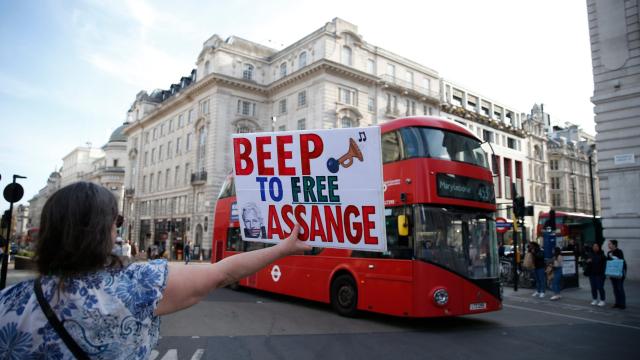The U.S. Department of Justice has promised a court in the UK not to place Julian Assange in a super-maximum security prison or solitary confinement if he’s extradited to the U.S., according to a new report from the Wall Street Journal. Solitary confinement is defined as torture by most wealthy countries around the world, though it’s common practice in the U.S. for even minor offences.
The UK denied a request by the DOJ to extradite Assange in early 2020, because the judge said the WikiLeaks cofounder was likely to attempt suicide if he was shipped to the U.S. to stand trial. Judges in Europe can block extradition to any country where it’s believed the prisoner will face torture, a practice the U.S. commits routinely without calling it by the name “torture.”
The 50-year-old Assange was sentenced to almost a year in prison in 2019 for jumping bail in 2012. Asange claimed asylum in Ecuador’s embassy in London and lived there for almost seven years before Ecuador’s government revoked Assange’s asylum and he was subsequently dragged out in April of 2019.
The DOJ under President Donald Trump charged Assange in the U.S. with 18 counts of violating the Espionage Act for publishing leaked material from the U.S. in 2010 and 2011, including documents about the wars in Afghanistan and Iraq. The DOJ has continued that prosecution under current president Joe Biden. Assange is also charged with one count of computer hacking. Together, the charges could bring a sentence of up to 175 years in prison.
The lone charge of “conspiracy to commit computer intrusion” was over Assange’s alleged attempt to help whistleblower Chelsea Manning crack the password on a U.S. government computer that contained allegedly classified material back in 2010. Manning spent a lot of her time in prison enduring the torture of solitary confinement.
Assange previously said he would give himself up to U.S. authorities if Chelsea Manning was pardoned, but he went back on that promise after President Barack Obama commuted Manning’s sentence. In 2017, Assange claimed Obama only let Manning go free to make Assange look like a liar.
The judge in Assange’s extradition case, Vanessa Baraitser, noted in her ruling back in January that the WikiLeaks cofounder would likely be placed in solitary confinement for 23 hours per day while he awaited trial in the U.S., something that most of the world sees as unacceptable — at least outside of totalitarian states like North Korea.
“Mr. Assange faces the bleak prospect of severely restrictive detention conditions designed to remove physical contact and reduce social interaction and contact with the outside world to a bare minimum. He faces these prospects as someone with a diagnosis of clinical depression and persistent thoughts of suicide,” Judge Baraitser wrote in her ruling earlier this year.
“I find that the mental condition of Mr. Assange is such that it would be oppressive to extradite him to the United States of America,” Baraister wrote.
The British judge did not rule on the other merits of the DOJ’s case and seemed sympathetic to the idea that Assange had crossed a line in the publication of classified materials, though notably the UK doesn’t have particularly robust protections for free speech.
Curiously, the DOJ has also reportedly promised that Assange might be able to serve his prison term in his native Australia after he faces trial in the U.S., something that’s not typical, as the Wall Street Journal notes:
Experts said the Justice Department’s offer to allow Mr. Assange to serve out any sentence in Australia was unusual, given that inmates usually only apply for such a move once they have been convicted, under the international prisoner transfer program.
“It is extremely rare, and it’s usually based on a process after conviction,” said Mark Lytle, a former federal prosecutor who is now a lawyer at the law firm Nixon Peabody. “To offer it up front to gain extradition, that is a break with the policy.”
Nick Vamos, a partner at London law firm Peters & Peters and a former head of extradition for the CPS, said that it is also unusual for the U.S. to provide broader assurances to a foreign court on prisoner treatment and that it had previously refused to do so in terrorism cases.
How likely is the DOJ to honour their agreements not to torture Assange? U.S. officials told the judge that they reserve the right to go back on any of their promises if Assange “were to do something subsequent to the offering of these assurances,” according to the Wall Street Journal.
It doesn’t inspire a lot of confidence, to say the least.
